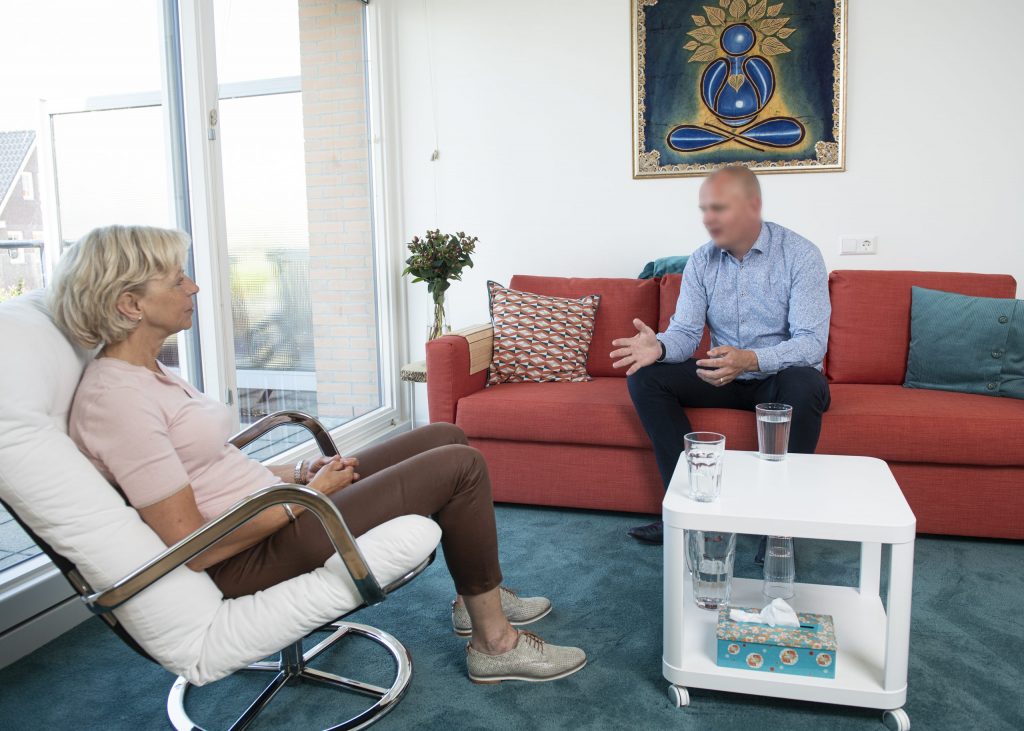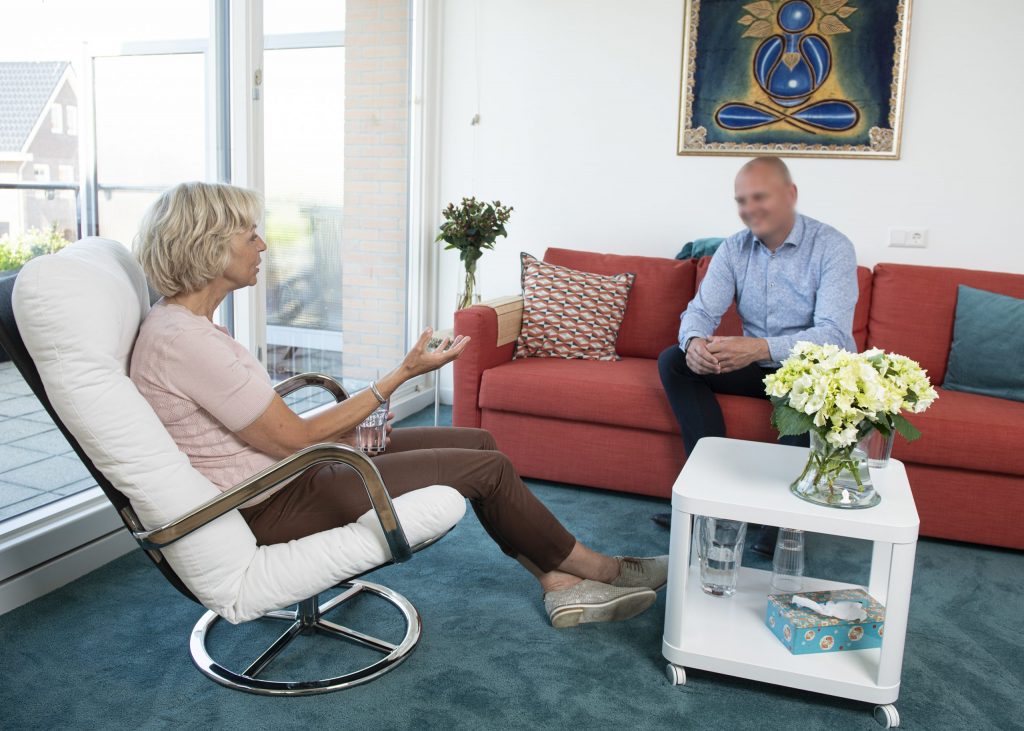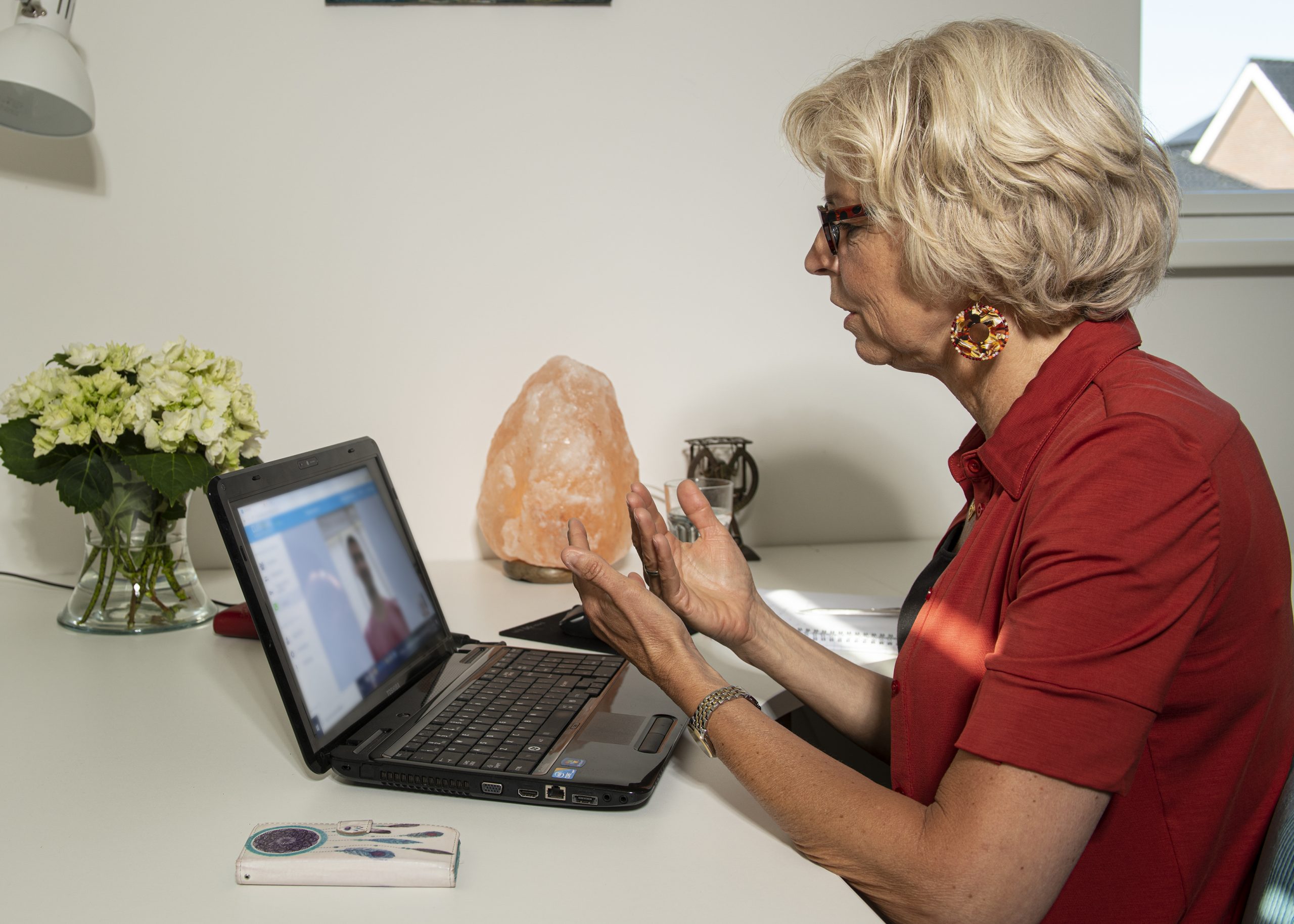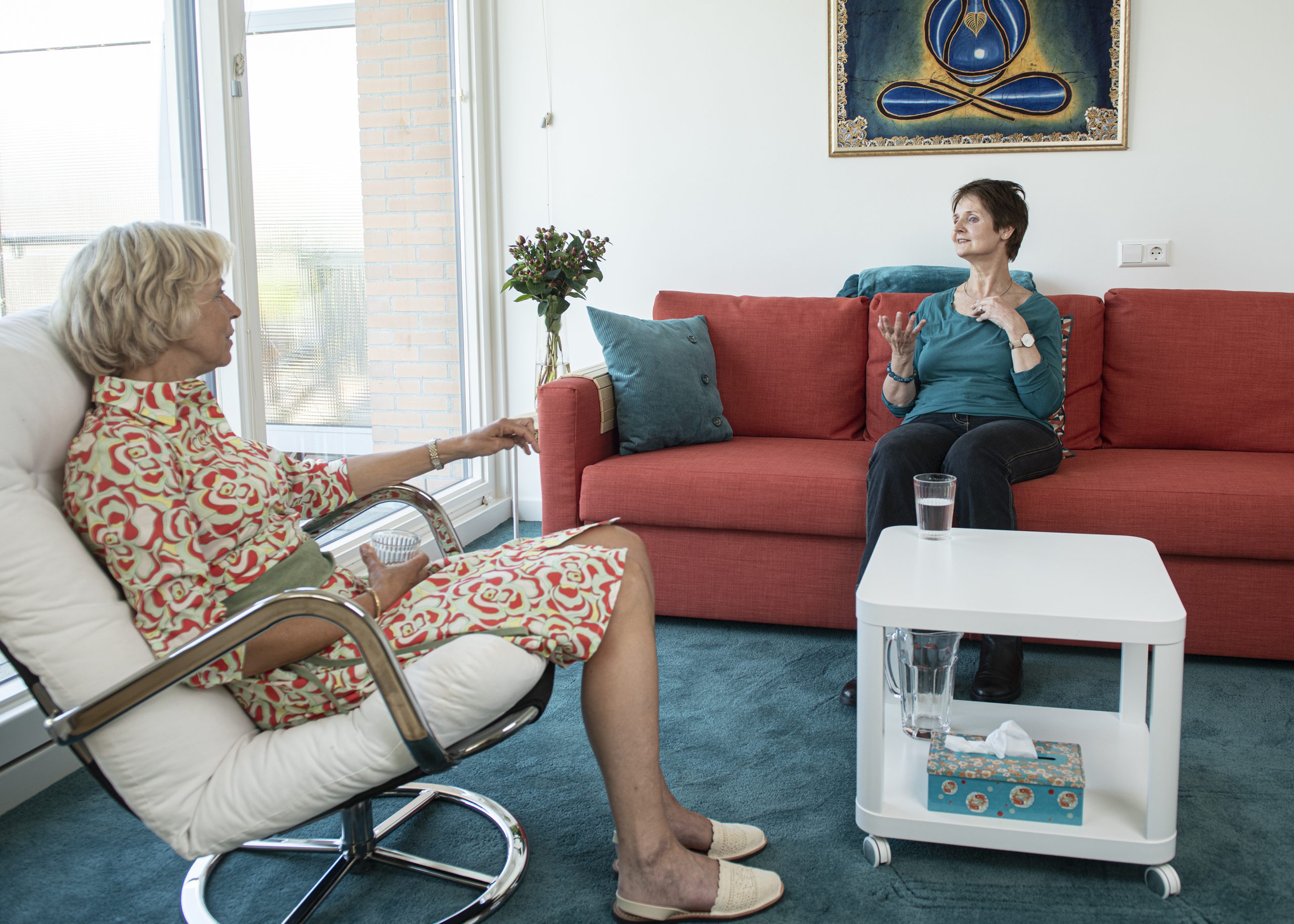Do you run into the same things over and over again?
When fear traps you

You see a child crossing the street while a car comes tearing around the corner. You don’t hesitate for a moment and run as fast as you can. You grab the child by his coat just in time. Your fear that something will happen to the child makes you take action. What a great function this fear provides.
Now, a different situation.
You are in a stressful situation because you have just been fired or because you are getting your life back on track after a divorce. The future is full of uncertainty. Do I have enough money? How do I deal with all the sadness that arises at the most awkward moments? How do I make sure I don’t project my anger onto others?
Fear engulfs you. Before you know it, you are immersed back into your worst self-talk scenarios. It is so lifelike that you almost certainly know that you are not going to make it, that everyone is going to let you down; that all your financial reserves are gone. You feel incredible tension and the talk is rampant.
You notice the effects of the fear and the selftalk in your daily life, as well. For instance:
- You have already called in sick at work a number of times.
- It is increasingly difficult to collaborate on
- You argue more and more with your partner and the tension in the house increases.
- Friends call less often because you always want to talk about how hard it is for you.
- You withdraw more and more.
- You feel alone.
- You have a headaches more often.
- You feel down.
That the fear is there, you cannot do anything about it. That the self-talk is coming, you cannot do anything about that, either. You do have a choice in how you react to that fear and the talk. But more on that later.
For the time being, you feel paralyzed and a victim of the situation. You are in a vicious cycle that seems impossible to break.
Do you recognize this feeling of desperation, really not knowing what to do to prevent your life from being ruled by fear?
From my own experience, I know that the choice to take responsibility for my own well-being is in my own consciousness. But, how to do this has often been a quest for me. That movement is needed is one thing that is certain.
Without boundaries you are adrift
Do you recognize the following:
- You are tired, but still say ‘yes’ when your neighbor asks you to run an errand for her one afternoon. Earlier that day you asked her if you could bring her anything. Now you have to go out again.
‘What she is asking for now, she could have asked me this morning’. You are indignant and angry at the same time. - When asked by your colleague whether you want to write the report, you say ‘yes’. Once he’s out of the picture, you’ll wonder why you said ‘yes’. You already have such a backlog of your own work. ‘He knows I’m super busy, right? Actually, I’m just angry with him’.
- You have made time for a walk. Wonderful for a while, you think. After 5 minutes, you meet an old acquaintance. Apparently, she wants to catch up. The last thing you feel like doing at that moment. Fifteen minutes later, you finally managed to finish the conversation. You feel anger rising. ‘I gave several hints that I wanted to continue my walk, but she kept talking’. If you think about it longer, you blame yourself for not being clearer.
This also happens to me now and then. You can read about this in my blogs. As a result, I initially focus my anger or frustration on the other person until the moment I realize that I am really just angry with myself. I should have let that person know what I do or don’t want. I cannot make the other person responsible for my feelings.
If you grew up in a family where there is always 'a hassle', then you would be crazy to talk about it and
draw attention to yourself.
As a child and for a long time afterwards, it happened to me almost all the time. I said ‘yes’, but actually I wanted to say ‘no’. Often, I didn’t even know what I really wanted. As long as the other person was satisfied…. Because how can you set your limits if you haven’t learned to take yourself seriously?
What I have seen with clients and myself is that the reason we don’t set boundaries often stems from the fear of rejection, not being liked, or the fear of conflict.
If you continue to adapt, you will become increasingly dissatisfied, maybe even depressed, or you will end up burned out. You feel insecure and powerless, so that when someone asks you to do something, you can’t speak up. All you can say: ‘Yes, that’s okay’.
It seems like you have absolutely no influence on anything.
But nothing could be less true.
Loss, grief and trauma
Everyone faces loss in life. Loss of a loved one, of health, of money, of status. Line up ten people, and they each have a different way of dealing with it. How do you deal with this? This is a tough job for almost everyone. A feeling of powerlessness, feeling like a victim, withdrawing and disappearing into a dark hole are just a few examples.
But also, working hard can produce a lot of distraction. However, this apparent rest is only temporary.
During the period that I did not see my children, I fully focused on work and education. As soon as colleagues started talking about their kids, I made sure to leave as quickly as possible. It was years before colleagues knew that I had three children. The loss was too great and this strategy helped me through it. By the time the children were adults, and we built a bond step by step, the emotions started to loosen up. It just couldn’t be stopped. A lot of time and therapy further helped me to leave overwhelming guilt behind me.
You can choose to walk around the pain with a bow. It is inevitable you will subsequently experience that you are confronted with this pain again and again. You are consciously or unconsciously on alert continuously to avoid a confrontation with your pain, and remain alert to prevent it. The result is that you live under constant stress.
Or, you project your pain onto others, so that you end up in conflicts more and more often. Your relationships break down, there are hassles in the family, and your social contacts are withdrawing.
The pain has you in its grip. The consequences are sometimes heartbreaking. You end up in a vicious cycle. You want to avoid the pain, but you endure other painful experiences.
Until you are willing to really look at it.
Reviews
Corrie
Another setback
Why is this happening to me again?
- I finally found a job that I like .. I lose my job!
- After many arguments, the contact with my brother has finally been restored and less than a week later, I start hassling my neighbors. I always seem to get into a conflict somewhere.
- I am just coming out of being burned out .. my partner wants a divorce.
Do you recognize this? Nobody really wants to be a victim, and yet many people feel like a victim.
Yes, bad experiences often happen to us. You don’t choose that. It seems as if you are sucked into the depths. And, it is also important to pay attention to what that situation does to you. For example, you may feel a lot of sadness and anger about a conflict with your partner. By regularly taking a step back, you come back to yourself. What really lives in me now? Can all of my feelings be there without judgment?
If not, they will unfortunately come back on your path like a boomerang.
What I see in daily practice is that everyone reacts so differently to a bad experience. When I started working with clients about 20 years ago, I was so intrigued by it. The researcher in me wanted to know what makes one client leave unpleasant experiences behind in a seemingly simple way and another gets completely off track. A practical example.
Jan and Willem, two colleagues, are told that they will lose their fantastic jobs. As a process supervisor in the reorganization of their company, I come in contact with them. Both men are completely upset, there is anger, sadness and fear. There is also denial. This cannot be true.Don’t these things only happen to other people?
Six months later I see Jan in my practice. He has been bothered by nasty images that have come up ever since he witnessed a serious traffic accident. I ask him how he was doing after his dismissal. ‘I felt really bad for a few weeks. Then I turned off the switch for myself and realized I can’t change anything about this. But, what can I change?’ Jan started an additional course, and shortly afterwards, found his current job through his network.
A year after I met Willem during the reorganization, I see him in my practice at the urging of a friend. He has now entered a black hole; his relationship has been ended by his partner, he has hardly any social contacts and he still has no job. He is desperate and feels powerless. He signed up with fresh reluctance. “What have I got to lose?” In the first conversation he says that he is so angry with his old employer. He has tried to challenge the dismissal, but to no avail. “It’s just not fair.”
Willem is so focused on the fact that something has been done to him that he is not aware that he is responsible for his own well-being; that he can investigate what he can influence. If he hadn’t acted, chances are he would just disappear deeper into the black hole.
Getting moving is the remedy; especially if you feel like a victim. And how do you do that? Where do you start?
Towards an effortless existence

In my eyes, every person is innocent. Every person has inner wisdom. Sometimes it seems like you’ve lost this on the way. This is not true. You just can’t reach it because of the bumps you’ve suffered in life, and by limiting beliefs that you have made your own.
You are formed in life by what you experience in your youth and during the rest of your life. Sometimes you see the same themes coming back for generations. In your own life, you also see your own struggle that presents itself repeatedly. For example, that you have once again let yourself go beyond your boundaries, that you again have to deal with loss, that you have again fallen into conflict, that you feel like a victim again.
We all develop survival strategies to avoid the pain we have previously experienced. By survival strategies I mean things such as: mostly hard work, wanting to be in control, thinking too much instead of feeling, blaming, addiction. And sometimes, we shoot in our pain part. We feel like a victim or we display childlike behavior.
The good news is that your survival mechanism often has a great quality to it. An example from my own life: I taught myself at a young age to first discover what another person needs. My own needs were secondary. With this unconscious strategy, I learned how to get the appreciation and recognition that everyone wants. Fortunately, in my adult life, I have become more and more aware of my own needs. The fact that it is second nature for me to empathize with others is very useful in my work. We quickly get to the heart of the problem.
You are innocent even if you turn on your survival or pain mechanisms.
Your body responds to a trigger like a kind of alarm bell. The emotions that have not yet been processed are still stored in your body. You can be quite bothered by these triggers, for example, because you react very strongly. This will not pass by itself. In fact, you will react more and more strongly. All you have to do is go to the pain. Not to bring back all kinds of bad memories, but to pay attention to your physical and emotional reaction to the present moment. Going it alone is often too much to ask of yourself.
When the pain in us diminishes, we also need less of our survival mechanism. Our ‘real self’ is given space again. I see as a journey of discovery to our ‘real me’; who we are at the core. From that core, you know that you are responsible for your own well-being, that you are not responsible for the feelings of another, that you can be completely there with both your beautiful and your dark sides. You live from trust instead of fear.
In this way, we all walk our own path at the pace that suits us. One is no better than the other. There could be all kinds of reasons why you haven’t gotten around to going to the pain yet. Perhaps you feel that you don’t have room for it now; that there are more important issues that require your attention. Realize that, sometimes, it is your survival mechanism that whispers this to you. And sometimes, it is also the case that it is not the right time, for example, when you have your hands full arranging practical matters when a loved one is ill or dies. Or, you are so full of adrenaline that you think you can manage that way.
Be that as it may, in the end, it is inevitable that you must look the pain in the eye. At least, if you want to be released from it. And, when the moment comes, you will certainly take action.
What change can you expect?
You feel more satisfied, so you:
- experience more happiness, pleasure and harmony
- communicate better
- are more ‘in the moment’
- no longer have to search for something
- experience more love for yourself and the other.
You have more zest for life, so you:
- are more creative
- are happier
- enjoy life more
- deal better with setbacks.
You are more aware, so that you:
- treats yourself and others with love
- confidently make your choices
- experience more inner peace
- know what’s right for you
- know what you are good at and focus especially on that
- you realize, on a deeper level, that you can really be yourself
- have an eye for your dark side without judgment.
You have more confidence and feel more powerful, which help you:
- make your voice heard in a conversation
- experience more connection with others
- express your opinion in a calm manner in a meeting
- clearly know what needs you have
- be more aware of your feelings
- take yourself seriously
- be more able to take responsibility for your own well-being
- knows when you can leave the responsibility with the other.
What type approach can you expect?
You start by completing a short questionnaire in which you formulate your request for help. It may not be clear yet and then we will find that out later.
After sending in this form, you make an appointment yourself via the calendar. This free telephone conversation will last approximately 15 minutes with a maximum of 30 minutes. I see this appointment as a way for both of us to investigate whether there is a click. In this conversation, I will immediately share my ideas about the core of the problem and the approach I propose with you. My feedback is based on many years of practical experience as a psychologist and as an expert by experience.
If we both want to go further, there are a number of options available.
What forms of treatment can you expect?
I work in an intuitive way and rely on the knowledge I have gained in my role as a psychologist over the past 20 years. Methodologies I like to use are EMDR and EFT, often in combination with inner child work and family constellations. I also find a lot of inspiration in Marshall Rosenberg’s method of Connecting Communication (Non-Violent Communication).
For more information about the treatment modalities look here.
What if you can't afford it?
You may be in a situation that you would like to participate, but the financial side is holding you back. If you would like, you can contact me so that we can investigate together what it takes to participate..


